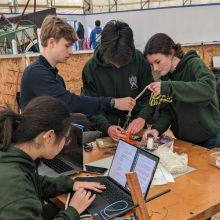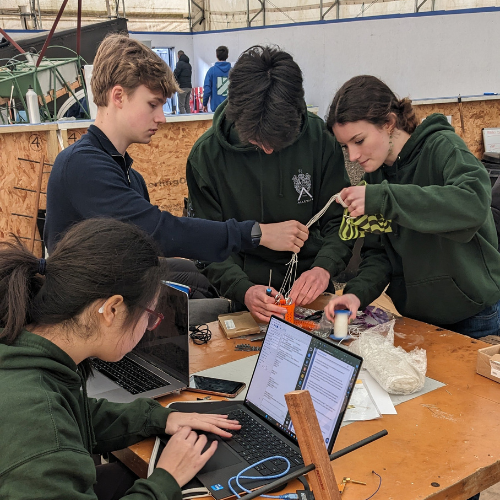






Our AiQ curriculum and framework, the Alleyn’s Intelligence Quotient, empowers our young people to direct technology for regenerative, environmental and social good. Four days in Boston at MIT (Massachusetts Institute of Technology) cemented for me how closely aligned our values and intentions are: Team RAISE and Team Alleyn’s share the same vision for the future.
Erik Brynjolfsson, the Director of the Stanford Digital Economy Lab, believes, “The grand challenge of the coming era will be to reap the unprecedented benefits of AI, including its human-like manifestations, while avoiding the Turing Trap.” He defines this trap as our tendency to focus too much on how machines may mimic humans rather than how they can augment us. This idea underscores the importance of giving our young people the knowledge, skills, and opportunity to build the world to be better. Our pupils should be empowered to not only use machines in the most effective ways, but also for the right reasons – with moral integrity and critical clarity.
On the first morning at the RAISE Summit for AI and Education, we heard from Hal Abelson. He seeks to democratise computing — making information technology a tool for everyone. His rally cry: stop just learning about and DO! One student, Amy in the photo below is a brilliant example of this. She joined her school’s App-In Club, met teammates online from other states and designed a real-world solution to a complex problem. Together they built an app to translate American Sign Language (ASL) into text. In reality, the beauty of the process was even richer as all the students learned ASL as part of the project and then started thinking of wider implications and solutions as they learned more. This is exactly the sort of project we are expecting to see in our Year 12 AiQ courses this year.
We heard many stories to illustrate how we can be directing technology for good in the days at RAISE but the one that really struck me was of the powerful Dharavi Tech Girls. They joined the Slum Innovation Project where they were introduced to the role of stories in personal narrative and how technology can be used to challenge the status quo. They attended a Leadership and Technology for Social Good workshop and in 2015 they published their first mobile app, Women Fight Back, on the Google Play store, engaging their community to use this app to address the problem of violence against women and girls. They made prototypes of apps that addressed the problems of water collection, girls’ education, community cleanliness and child labour; each time developing their prototypes to make them work better and eventually publish them for their community. Equity, problem solving and iterative community-based solutions are at the heart of our Alleyn’s agenda too. For the individuals involved, they weren’t solely consumers but shapers of the technology and the systems they found themselves within: they were empowered and deeply educated by the impact they had.
Look again at that date. This was 9 years ago! We are now in a whole new world of possibility through developments in AI. It is worth exploring Aptly to gauge the scope of what may be to come: speech to code for the generation of apps opens the creative process to all.
MIT’s commitment to opensource knowledge and the importance of funding in education were highlighted by panels featuring sponsors such as the Lego Foundation, the Hong Kong Jockey Club and Google. They were also keen to reinforce the value of donorship in advancing educational initiatives. Both in the moment and after the event I was aware of my immense gratitude to our generous donor who enabled this amazing opportunity for us in our development and ultimately for our pupils at Alleyn's. I had no idea how much I would learn in those few days and how much it would support the development of AiQ.
Perhaps the most impressive, scaled example of implementing computational thinking was through Cool Think in collaboration with Hong Kong’s Primary Schools. It really demonstrated how important it is to start the process of building critical clarity early. At Alleyn’s, our Reception pupils will benefit from the “My Robot and Me” scheme of learning which has been developed to inspire the youngest members of our Alleyn’s community to use digital creativity and sharpen their skills to use technology for social good from an early age.
Both RAISE and Alleyn’s are committed to creating a just society, a thriving planet and flourishing people. That comes with responsibility and hard work: we as educators must be up to date on the possibilities available for our young people and we must influence policy-making to both enable and protect them.
The stakes are high. This is a pivotal moment in time and as the adults in the room we are responsible for fixing the things which are damaged. But our young people, as they grow, are crying out for guidance on how to join the conversations and effect change too. Raechel Walker shared her favourite comment from the Futuremakers Programme that MIT run as a summer camp. She said that one student wrote in their feedback: “I know how to use my academic success to combat racism.” At Alleyn’s, we know we are good at fostering academic success. Through AiQ, we are ensuring that our students are also able to say that they know how to leverage their success to make a positive impact.
Eric Klopfer, co-faculty director for MIT’s J-WEL World Education Lab, asked us to apply Bloom’s taxonomy to AI and highlighted that the aim should be to get our young people creating and evaluating for themselves for genuine AI fluency. We must ensure learning is design based, authentic, interactive and collaborative. This is exactly what Alleyn’s is doing.
